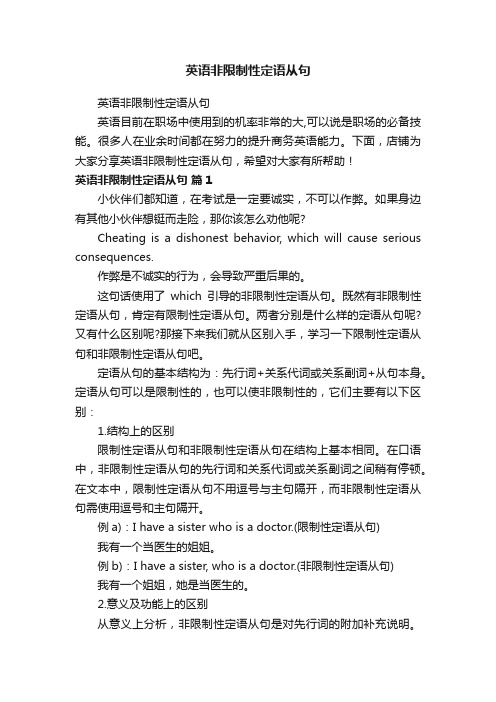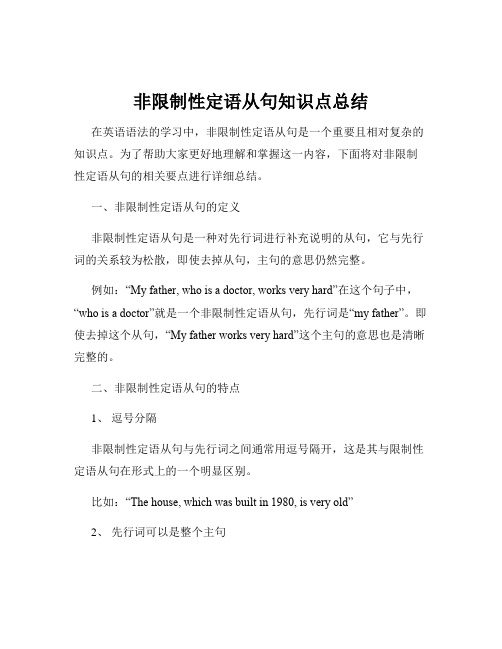非限制性定语从句
非限制性定语从句

(1)限制性定语从句和主句的关系十分密切, 若省去,主句的意思就不明确。主从句之间 不用逗号隔开。而非限制性定语从句则不然。 试比较:
This is the best book that I have read. This is a good book, which is easy to understand.
(2) as多用于下列习惯用语中 as anybody can see 正如人人都能看到的那样 as is well known = as is known to all 众所周知 as we had expected 正如我们所预料的那样 as often happens 正如经常发生的那样 as has been said before 如上所述 as is mentioned above 正如上面提到的
(5)关系代词在非限制性定语从句中作介词的宾语 时,介词前可以有被介词短语所修饰的词。如: He has two daughters, the elder of whom is married. (6)在非限制性定语从句中,关系代词还可以 作介词的宾语。 He is ill, in spite of which he keeps on studying.
3. 关系代词as, which引导非限制定语从句时的区别
(1)as和which都可指主句的整个意思,而不是主 句中的某一个词。as引导的非限制性定语从句, 既可在主句前,又可在主句后,有时还可插入主 句中;而which引导的非限制性定语从句一般置于 主句之后。如: The weather turned out to be very good, which was more than we could expect. As is known to all, the moon travels round the earth.
英语非限制性定语从句

英语非限制性定语从句英语非限制性定语从句英语目前在职场中使用到的机率非常的大,可以说是职场的必备技能。
很多人在业余时间都在努力的提升商务英语能力。
下面,店铺为大家分享英语非限制性定语从句,希望对大家有所帮助!英语非限制性定语从句篇1小伙伴们都知道,在考试是一定要诚实,不可以作弊。
如果身边有其他小伙伴想铤而走险,那你该怎么劝他呢?Cheating is a dishonest behavior, which will cause serious consequences.作弊是不诚实的行为,会导致严重后果的。
这句话使用了which引导的非限制性定语从句。
既然有非限制性定语从句,肯定有限制性定语从句。
两者分别是什么样的定语从句呢?又有什么区别呢?那接下来我们就从区别入手,学习一下限制性定语从句和非限制性定语从句吧。
定语从句的基本结构为:先行词+关系代词或关系副词+从句本身。
定语从句可以是限制性的,也可以使非限制性的,它们主要有以下区别:1.结构上的区别限制性定语从句和非限制性定语从句在结构上基本相同。
在口语中,非限制性定语从句的先行词和关系代词或关系副词之间稍有停顿。
在文本中,限制性定语从句不用逗号与主句隔开,而非限制性定语从句需使用逗号和主句隔开。
例a):I have a sister who is a doctor.(限制性定语从句)我有一个当医生的姐姐。
例b):I have a sister, who is a doctor.(非限制性定语从句)我有一个姐姐,她是当医生的。
2.意义及功能上的区别从意义上分析,非限制性定语从句是对先行词的附加补充说明。
如果删去,不会影响主句意义的完整。
而限制性定语从句修饰和限制先行词,明确先行词内容,是先行词不可缺少的定语。
如果删去,会影响主句意义的完整。
例c):I have an elder brother who is a teacher.(限制性定语从句)我有一个当老师的哥哥。
非限制性定语从句

Consolidation 2
1. His movie won several awards at the film festival, _____ was beyond his wildest dream. (2007上海) A. which B. that C. where D. it 2. She will fly to Washington, _________ she can enjoy herself. A. where B. that C. which D. /
关 系 副 词 关 系 代 词
指原因
why
×
非限制性定语从句中的关系词
在非限定性定语从句中,不能用关系副词why
和关系代词that。要用for which代替why.
I
had told them the reason, for which I didn‘t attend the meeting. 我已经把理由告诉了他们, 为此我没有去开会。
big smile.
能去掉
先行词是名词或 代词
This is the best novel that I have ever read.
The novel, which I read last t, is very interesting.
先行项可以是名 词或代词,也可 以是句子
The novel is very interesting, which made me very glad.
关系 副词
where
when why
时间 原因
I like the girl who is making a pose.
修饰限制, 译为“的”
补充说明, 译成并列句
非限制性定语从句

He wished to be such a man as Lei Feng was.
在the same …as结构中,as可以换成that, 但句意不一样。
This is the same book as I read last week.
这和我上周读的那本书是一样的。
This is the same book that I read last week.
他的妈妈很爱惜他,对他也很严格。
(2)先行词指人,在句中作宾语whom:
His wife, whom you met at my home, was a teacher.
他的妻子,就是你在我家遇见的那个,是一位老师。
(3)先行词指物,在句中作主语或宾语which:
Her house, which was built a hundred years ago, stood still in the earthquake. 那座房子在地震中依然耸立,它是一百多年 前建造的。 注意:无论先行词指人或者指物,在句中作 主语或者作宾语,非限制性定语从句的引 导词都不能用that。
(他还有其他的哥哥)
(2) 非限制性定语从句 His brother, who is now a doctor, always encourages him to go to college. 他的哥哥是当医生的,常鼓励他要考上大学。 (他只有一个哥哥)(“唯一”概念)
2、运用非限制性定语从句的情况
(非限制性定语从句中不用关系 词that/why;非限制性定语从句 中关系词不能省略)
Practice
1. The famous basketball star, who ___ comes from America, will visit our school soon. 2. In those days, she used to go to Mr black,with whom she had a wonderful _____ time.
非限制性定语从句

games and songs. 6. He is absorbed in work, ____he often was.
hometown,will open next year. 3. We shouldn’t spent our money testing so many people, most of
_____are healthy 4. Chan’s restaurant on Baker Street, ____used to be poorly run, is now
(2)Xi’an, which we visited last year, is really a beautiful city.
(3) My favorite season is autumn, when we celebrate the Mid-Autumn
Festival.
2. 在限制性定语从句中,作宾语的关系代词可以省略,但在非限制性 定语从句中,作宾语的关系代词不能省略。如:
(1)His father, who is a famous actor, will go to Canada next week.
(2)I was born in Beijing, which is the capital of China. 2. 当先行词被指示代词、形容词或物主代词修饰时,要用非限制性定 语从句。如:
练习: 1. His movies won several awards at the film festival, _____was beyond
什么是非限制性定语从句

什么是非限制性定语从句定语从句有限制性和非限制性两种。
限制性定语从句是先行词不可缺少的部分,去掉它主句意思往往不明确;非限制性定语从句是先行词的附加说明,去掉了也不会影响主句的意思,它与主句之间通常用逗号分开,将非限定性定语从句放在句子中间,其前后都需要用逗号隔开。
非限制性定语从句可以简单理解为就是没有紧跟在修饰对象(即先行词)之后的定语从句,与限制性定语从句刚好相反。
也就是说,先行词和非限制性定语从句之间常被逗号或是其它语句部分隔开,而没有紧密连接在一起。
需要注意的是:1)引导词that(关系代词)和why(关系副词)一般不用于引导非限制性定语从句。
2)引导词which(关系代词)在引导非限制性定语从句时,不仅可以指代主句的某部分内容,还可以用来指代整个主句。
具体示例如下:(下划线部分是非限制性定语从句;加粗字体是该定语从句的修饰对象,也就是先行词。
)例1:I am looking for a watch, which Jason bought me.例2:The puppy peed in his arms, which made us laugh.例3:Penny, who used to be a waitress, becomes a successful saleswoman.例4:Many people witnessed the accident, some of whom called the police.例5:Jacob is the silent boy standing in the back, whose hair is black and straight.例6:He realized the days were all over when they could talk everything to each other.例7:She wandered in the school alone and aimlessly, where they last met.值得注意的是,由于定语从句的本质是形容词,通常只起到修饰作用,所以定语从句本身一般不会对主句的完整性产生任何影响。
非限制性定语从句知识点总结

非限制性定语从句知识点总结在英语语法的学习中,非限制性定语从句是一个重要且相对复杂的知识点。
为了帮助大家更好地理解和掌握这一内容,下面将对非限制性定语从句的相关要点进行详细总结。
一、非限制性定语从句的定义非限制性定语从句是一种对先行词进行补充说明的从句,它与先行词的关系较为松散,即使去掉从句,主句的意思仍然完整。
例如:“My father, who is a doctor, works very hard”在这个句子中,“who is a doctor”就是一个非限制性定语从句,先行词是“my father”。
即使去掉这个从句,“My father works very hard”这个主句的意思也是清晰完整的。
二、非限制性定语从句的特点1、逗号分隔非限制性定语从句与先行词之间通常用逗号隔开,这是其与限制性定语从句在形式上的一个明显区别。
比如:“The house, which was built in 1980, is very old”2、先行词可以是整个主句非限制性定语从句的先行词不仅可以是一个名词或代词,还可以是整个主句。
例如:“He failed the exam, which made his parents very disappointed” 这里先行词就是“He failed the exam”整个句子。
3、关系词的使用(1)关系代词:which、who、whom、whose 等。
which 指代物,在从句中可作主语、宾语等。
who 指代人,在从句中作主语。
whom 指代人,在从句中作宾语。
whose 表示“……的”,在从句中作定语。
(2)关系副词:when、where 等。
when 指代时间,在从句中作时间状语。
where 指代地点,在从句中作地点状语。
需要注意的是,非限制性定语从句中不能使用 that 作为关系词。
三、非限制性定语从句中关系词的具体用法1、 which 的用法(1)which 可以指代主句中的某个名词,也可以指代整个主句。
非限制性定语从句

非限制性定语从句1. 定义非限制性定语从句(Non-restrictive Relative Clauses)是指用来修饰一个名词或代词,且不对其进行限定的定语从句。
这种从句通常提供一些额外信息,而不是对名词或代词进行修饰、定义或区分。
非限制性定语从句和限制性定语从句的区别在于非限制性定语从句用逗号或破折号将其与主句分隔开来,而限制性定语从句则不用分隔符。
例如:•限制性定语从句:The book that I borrowed last week was very interesting.•非限制性定语从句:My friend, who is a doctor, came to visit me.非限制性定语从句通常用来提供额外的信息,使得整个句子更加丰富和具体。
2. 结构非限制性定语从句的结构相对简单,通常由关系副词(如where, when, why)或关系代词(如who, whom, which)引导,并且使用逗号或破折号将其与主句分隔开来。
以下是一些常见的关系代词和关系副词:•关系代词:who, whom, whose, which, that•关系副词:where, when, why例如:•关系代词引导的非限制性定语从句:My brother, who is a teacher, lives in London.•关系副词引导的非限制性定语从句:I still remember the day, when we went to the beach.3. 示例以下是一些示例,以帮助读者更好地理解非限制性定语从句的用法和作用。
1.This is my father, who is an engineer.2.The house, which was built in the 19th century, is now a museum.3.She loves music, which is why she plays the piano every day.4.The dog, whose tail is wagging, seems very happy.5.Tom finally got the job, which he had been dreaming of.4. 注意事项在使用非限制性定语从句时,需要注意以下几点:•逗号或破折号:非限制性定语从句通常使用逗号或破折号与主句分隔开来,这有助于读者更好地理解句子的结构和意思。
- 1、下载文档前请自行甄别文档内容的完整性,平台不提供额外的编辑、内容补充、找答案等附加服务。
- 2、"仅部分预览"的文档,不可在线预览部分如存在完整性等问题,可反馈申请退款(可完整预览的文档不适用该条件!)。
- 3、如文档侵犯您的权益,请联系客服反馈,我们会尽快为您处理(人工客服工作时间:9:00-18:30)。
Ⅰ. 非限制性定语从句我将永远不会忘记我第一次遇到你的那一天。
(when引导限制性定语从句)*They will set off for London next year, when they will have enough money.他们打算明年去伦敦, 届时钱也凑够了。
(when引导非限制性定语从句)*He has found the hammer that he was looking for.他找到了他正在寻找的那把锤子。
(that引导限制性定语从句)*A man who doesn’t want to learn from others can’t achieve much.一个不向别人学习的人是不能指望有多大成就的。
(who引导限制性定语从句)*The reason why he refused her is not known.他拒绝她的原因还不知道。
(why引导限制性定语从句)*That Peter will marry Alice, which has not been announced yet, has spread around.彼得要娶爱丽丝这件事还没宣布, 却已被传得沸沸扬扬。
(which引导非限制性定语从句)*The children, who wanted to play football, were disappointed when it rained.那些想踢足球的孩子, 都因下雨而感到失望。
(who引导非限制性定语从句)【名师点津】非限制性定语从句关系词三不能(1)关系副词why不能引导非限制性定语从句, 但可以用for which代替why来引导。
(2)引导非限制性定语从句指物时, 关系代词不用that只用which。
(3)在非限制性定语从句中, 关系代词作宾语时不能省略, 关系代词指人时, 只能用whom, 不能用who。
【思维延伸】间隔式定语从句一般来说, 定语从句紧跟在先行词之后, 但有时定语从句和先行词被其他成分隔开。
这种情况有:1. 定语分隔型一个中心词带多个定语时, 一般来说, 结构较短, 与中心词关系密切的在前, 反之靠后。
*They set up a state of their own, where they could be free to keep Negroes as slaves.他们建立起自己的国家, 在那儿他们可以随心所欲地把黑人当作奴隶。
2. 状语分隔型在定语从句较长的情况下, 为了保持句子平衡, 常把作状语的单词、短语或从句插到定语从句和先行词之间, 使定语从句与先行词分离。
*In 1898, they believed that there exists something in nature which gave out radioactivity.1898年, 他们相信自然界中存在着具有放射性的某种东西。
3. 谓语分隔型这种情况, 先行词多是主句主语, 所带的定语从句较长, 而句子的谓语部分又恰恰较短, 为了使句子结构紧凑, 常把定语从句放在谓语后面。
*A new teacher will come tomorrow who will teach you Germa n.教你们德语的新老师明天就到。
4. 宾语补足语分隔型句子的宾语带定语从句时, 往往由于宾语补足语较短, 而定语从句较长, 这时先行词和定语从句就会被宾语补足语所分隔。
*He made the child laugh who had cried just a moment ago.他使那个刚才还哭的孩子笑了。
【即学活用】用适当的关系词填空。
①I will cherish the time _____ I won the prize in the English competition.②They work in a factory __________ makes radio parts.③I met the famous professor in the hotel, ______ the meeting was held.④James lent me some money, ______ was very generous of him.二、as, which引导非限制性定语从句的区别正如有人曾经说过的那样, 金钱是万恶之源。
*Tom did really well in his exams, which was a big surprise.汤姆考得非常好, 真令人惊讶。
【即学活用】用适当的关系词填空。
①They had to delay the sports meet till next week, _____ the weather will be fine.②I know a woman named Mary, ______ story of personal responsibility has alwaysinspired me.③Dick is going to join in the football game, ______ was agreed at the meeting.④___ is said above, the number of the students in our school has increased.⑤The old couple, ______ I’m sure you remember, passed away within a week of one another.三、“介词+关系代词”引导的非限制性定语从句1. “介词+which/whom”既可以引导限制性定语从句, 又可以引导非限制性定语从句。
*The sun gives us light and heat, without which we can’t live. 太阳为我们提供光和热, 没有它我们就不能生存。
*There wasn’t a single person in the dark street, to whom she could turn for help.漆黑的街上没有一个她可以求助的人。
2. 介词后面的关系词不能省略且that不可用于此结构。
*Air, without which man can’t live, is really important.空气确实太重要了, 没有空气人类就不能生存。
3. 某些在从句中充当时间、地点或原因状语的“介词+关系代词”结构可以同关系副词when, where和why互换。
*Is this company the one in which(=where)you worked half a year ago?这就是半年前你在那儿工作的公司吗?4. 在“介词+which/whom”之前可以使用表示数量或定位的数词或代词。
(1)常见的代词有all, none, both, neither, any, each, either等。
*He loved his parents deeply, both of whom are very kind to him.他深深爱着他的父母, 他们都对他很慈爱。
(2)常见的表示数量的词有a few, several, many, a lot, a large number, a great many,a great deal, a large quantity等。
*They asked me a lot of questions, many of which I couldn’t answer.他们问了我很多问题, 其中有许多我不会回答。
(3)the+形容词的最高级, the+last, the+序数词。
*There are seven continents in the world, the largest of which is Asia. 世界上有七大洲, 最大的是亚洲。
【即学活用】根据语境, 填入恰当的引导词。
①There are four rooms in the house, one of ______ is a drawing room.②We will move into the new house next week, by ______ time it will be completed.③The workers, some of ______ stayed there for two years, came from Africa.④His new job has several advantages, ___________is a large salary.⑤The Nile, from ______ electricity is produced, now runs regularly below the dam.四. 定语从句和其它从句的区分1.定语从句与并列结构(1)She won the first prize in the speech contest and _____ surprised us. (2) She won the first prize in the speech contest, _____ surprised us.2.定语从句与结果状语从句(1)This is such an interesting book ______ all of us want to read .(2) This is such an interesting book ______ all of us want to read it3.定语从句与地点状语从句(1)He advised me to live ______ the air is fresher.(2) He advised me to live in the place ____ the air is fresher.4. 定语从句与主语从句(1) _____ is known to everyone that the place is part of China.(2) _____ is known to everyone, the place is part of China.(3) _____ is known to everyone is that the place is part of China.(4) _____ the place is part of China is known to everyone.5.定语从句与宾语从句(1)Our teacher did all _____ he could to help them.(2) Our teacher did _____ he could to help them.6. 定语从句与同位语从句(1)The fact _____ she told me yesterday is very important.(2) The fact _____ she hasn’t known the result of the examination is clear.7.定语从句与表语从句(1) Is this factory ______ you visited a few days ago?(2) Is this the factory ______ the exhibition was held?8. 定语从句与强调结构(1)It is the place _____ they lived before.(2) It is in the place _____ they lived before.(3)-- Where did you interview the composer?-- It was in the hotel _____ he stayed.A. whereB. thatⅡ. 反意疑问句一、反意疑问句的基本概念反意疑问句又叫附加疑问句(tag question)。
